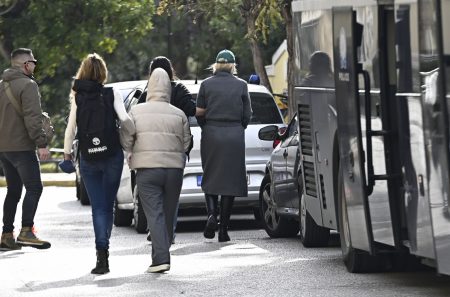By George Gilson
Athens has called on Turkey to recognise the genocide of the Pontian Greek population by the forces of Kemal Ataturk three days after the commemoration of the 100th anniversary of the beginning of the genocide with mass m death Marches.
An estimated 350,000 Pontian Greeks were systematically killed and died of famine and disease during death marches designed to effect an ethnic and religious cleansing in Turkey.
The Pontian genocide is part of the broader, systematic ethnic cleansing of Turkey’s Christian populations from the Ottomans at the end of the 19thcentury through the time of Kemal Ataturk in the 1920’s.
The Christian population was an estimate 20 percent of the population toward the end of the Ottoman period and by 1924 that had plunged to two percent of the population.
Premier authority on genocide recognises Pontians’
The International Association of Genocide Scholars (IAGS) in December, 2007, voted overwhelmingly to recognise the genocides inflicted on Assyrian and Greek populations of the Ottoman Empire between 1914 and 1923.
The resolution was as follows:
WHEREAS the denial of genocide is widely recognized as the final stage of genocide, enshrining impunity for the perpetrators of genocide, and demonstrably paving the way for future genocides;
WHEREAS the Ottoman genocide against minority populations during and following the First World War is usually depicted as a genocide against Armenians alone, with little recognition of the qualitatively similar genocides against other Christian minorities of the Ottoman Empire;
BE IT RESOLVED that it is the conviction of the International Association of Genocide Scholars that the Ottoman campaign against Christian minorities of the Empire between 1914 and 1923 constituted a genocide against Armenians, Assyrians, and Pontian and Anatolian Greeks.
BE IT FURTHER RESOLVED that the Association calls upon the government of Turkey to acknowledge the genocides against these populations, to issue a formal apology, and to take prompt and meaningful steps toward restitution.
That is why formally – aside fro their geopolitical aims – the Great Powers in 1919 gave Greece a mandate in Asia Minor (1919-1922) and specifically Smyrna (Izmir) and the surrounding area – to protect the remaining Christian population.
Greek foreign ministry calls for genocide recognition
“The recognition of historical truth, self-criticism, and the abandonment of revisionism is a show of strength, not weakness. They are requisites for dialogue in good faith, the tackling of extremities of nationalism, conciliation between peoples and countries and their peaceful co-existence,” the Greek Foreign Ministry said in a statement issued in response to a Turkish foreign ministry statement calling Greeks who spoke of the Pontian genocide radicals.
“It is the historic duty of all of us, and especially of our of neighbouring country Turkey, to recognise events such as the genocide of the Pontian Greeks so that the darkest moments of the past are not repeated and in order to heal the deep wounds left behind.”
Turkey: Talk of Pontian genocide is hate speech
In its statement, the Turkish Foreign Ministry on 21 May said that 19 May marks the beginning of its independence struggle, which effectively meant an ethno-religious cleansing beyond the defeat of the Greek Army in Asia Minor, which had exceeded its mandate.
“The attempts of some radical groups to cast a shadow on this meaningful day with their imaginary claims targeting our history, with their activities seeking to fuel hatred against Turkey as well as the statements of some politicians in Greece that distort historical facts for their political motives cannot be accepted,” the statement read.
“We remind the claimants of these unsubstantiated allegations that the responsibility of Greece for the atrocities committed by her army, which also violated laws of war while invading Anatolia, and her obligation to pay a compensation were laid down in the Treaty of Lausanne.”
“We bring to their attention that when the atrocities committed by the Greek Army against Turks reached an inconceivable magnitude, the allies of Greece established an Inquiry Commission and identified inhumane crimes of the Greek Army.”
“As a matter of fact, these baseless claims targeting our history bear no relation to reason, conscience, and fairness. This rhetoric is incompatible with our objectives to further our bilateral relations and leaves a negative legacy to future generations.”
“The nomination of our great leader Mustafa Kemal Atatürk for the Nobel Peace Prize by the then Prime Minister of Greece, Venizelos, in 1934 after the founding of the Republic of Turkey constitutes the clearest proof showing that there is no such historical issue between the two countries in contrast to the claims of some irresponsible politicians and radical Greeks.”


